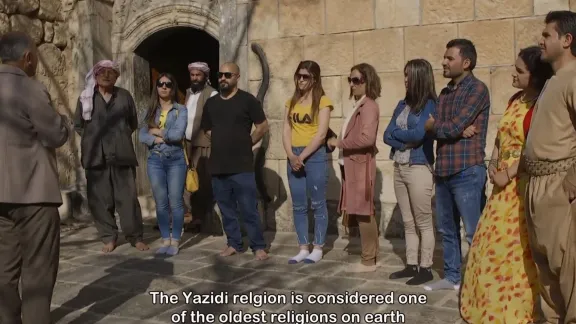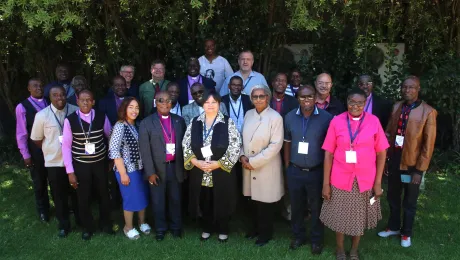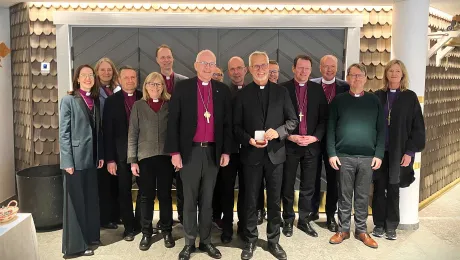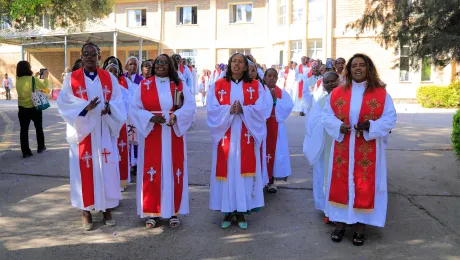
A screenshot from the film âPeace Journey,â presented as part of LWFâs contribution at the 2021 Geneva Peace Week.
LWF showcases grassroots initiatives from Iraq and Indonesia during Geneva Peace Week
(LWI) - The Lutheran World Federation (LWF) participated in the Geneva Peace Week from 1 to 5 November with a video highlighting the way short films can be a powerful tool in the work of interfaith peacebuilding. The video showcases two short films produced by peace activists in Iraq and Indonesia, with support from the Norwegian Center for Holocaust and Minority Studies.
The annual peace week is focusing this year on the theme: From seeds to systems of peace: weathering today’s challenges. It is taking place partly in person and partly online, offering a wide variety of podcasts, videos and other multimedia resources produced by civil society organizations and peace groups in different parts of the globe. Its goal is to galvanize leadership, build trust and strengthen international cooperation, at a time of growing concern over extremist voices and actions that promote hostility against members of different faith communities.
LWF’s contribution includes the two short films, ‘Place among the stars,’ produced by the LWF National Committee in Indonesia and local partner Jakatarub and ‘Peace Journey,’ produced by JAV, a team of young Yazidis living in Iraq. Both films are part of the Norwegian Center’s Inclusive Citizenship Project, supported by the Norwegian Ministry for Foreign Affairs. The video also features panel discussions with the film makers about the impact that this medium can have in promoting dialogue and inclusion in interfaith contexts.
Peace journey in Iraq
‘Peace Journey’ is a documentary style film showing the interaction of members from different faith communities in Iraq, as they learn about each other's traditions during a visit to the holy sites of Christians in Alqosh and Yazidis in Lalish. “Our point of this trip,” says one of the organizers, “is to convey a message to the world: religious diversity has always been a part of Iraqi society and it will continue to be so.”
The young Yazidi film makers worked together with renowned director and producer, Zahavi Sanjavi, who comes from Iraqi Kurdistan but currently lives in Sweden. Discussing the impact of the film on audiences in his native country, he notes that short film is one of the most effective ways of sharing information about other communities, in a context where there are people and organizations “which don’t want to spread knowledge and information about minorities and their rights."
Also taking part in the panel discussion is Saad Salloum from the non-profit organization MASERAT for media and cultural development. A journalist and university professor, he was also a co-founder of the Iraqi Council for Interfaith Dialogue. He underlines the way in which short films can combat hate speech in social media by challenging stereotypes around different communities. He stresses “the power of images to change hearts and minds,” adding that Iraq’s diversity is one of its most important resources for the future of the country.
Place among the stars in Indonesia
‘Place among the stars’ recounts a personal story of a woman and her daughter whose lives are threatened by religious violence. Despite her dramatic experience, the woman finds the courage to confront and forgive her aggressor. The themes of identity, vulnerability, reconciliation and shared humanity are powerfully portrayed as the perpetrator finds himself needing support from volunteers during the COVID-19 pandemic.
Director and interfaith activist, Risdo Simangunsong, explains that the personal format for the film was chosen because of its ability to inspire and provoke an emotional response from the viewer, adding that some crew members were themselves moved by the testimonies of religious diversity they experienced for the first time during the production of this film.
These short films showcase positive stories and realistic struggles from the grassroots […] demonstrating that dialogue and inclusivity is possible.
Also commenting on the importance of films for interfaith peacebuilding in the Indonesian context is Fernando Sihotang, human rights and advocacy coordinator for the LWF National Committee in his country. He highlights the value of the films in showcasing “the voices of victims” of interfaith violence, confronting past conflicts and teaching alternative narratives of “inclusivity and communality.” Panelist Sanrawit Gougsa from the London-based Minority Rights Group also praises the way films can “plant a seed of a new vision” of inclusive citizenship as they “open spaces of discussion and dialogue” about interfaith education.
The films and discussions are presented and moderated by Rev. Dr Sivin Kit, LWF’s Program Executive for Public Theology and Interreligious Relations. "These short films showcase positive stories and realistic struggles from the grassroots in Indonesia and Iraq,” Kit says. “By demonstrating that dialogue and inclusivity is possible in these very diverse contexts,” he concludes, “the films serve as lived examples to promote healthy interfaith relations with implications for a global audience.”
LWF/P. Hitchen


